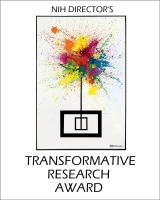2024 Awardees
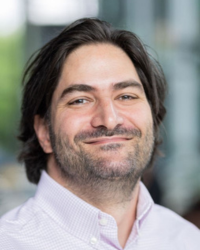
Julien Berro, Ph.D.
Yale University
Project Title: Programming Cellular Behavior by Mechanical Forces
Grant ID: R01-EB037112
MPIs: Alexander A. Green, Ph.D. and Xiaolei Su, Ph.D.
Julien Berro, Ph.D., is an Associate Professor of Molecular Biophysics and Biochemistry, and of Cell Biology at Yale University. He initially trained in Physics, Applied Mathematics and Computer Sciences at the Institut National Polytechnique de Grenoble, France. He obtained his PhD in Mathematical Modeling in Biology at Université Joseph Fourier, Grenoble, France, and trained in experimental quantitative cell biology during his postdoc at Yale University. His lab studies the mechanobiology of the actin cytoskeleton. The lab is currently developing synthetic mechano-transduction tools for discovery research and therapeutics development.
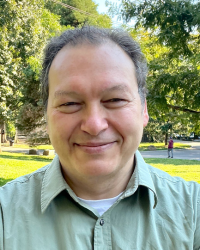
Alex Dranovsky, M.D., Ph.D.
Columbia University Irving Medical Center and New York State Psychiatric Institute
Project Title: Astrocytes as the Integrators of Neuromodulator Signals
Grant ID: R01-MH140020
Alex Dranovsky is an Associate Professor of Psychiatry at Columbia University Irving Medical Center and a Psychiatrist 2 at the New York State Psychiatric institute. He received his M.D. and Ph.D. in molecular pathology and immunology from Stonybrook University and did his clinical training in psychiatry and postdoctoral training in neuroscience at Columbia. He received numerous foundation and NIH awards including the NIMH BRAINS award. Alex's lab studies basic mechanisms underlying brain health and mental illness with the ultimate goal of developing new treatments. His research program is focused on understanding how stressful and enriching experiences cause lasting changes in brain function and why some developmental periods are especially sensitive to the effects of stress.
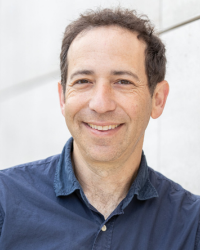
Michael Elowitz, Ph.D.
Caltech, HHMI
Project Title: A Spatial View of Hematopoietic Regeneration Dynamics in the Bone Marrow
Grant ID: R01-DK143671
MPI: Rong Lu, Ph.D.
Michael Elowitz is a Howard Hughes Medical Institute Investigator and Roscoe Gilkey Dickinson Professor of Biology and Biological Engineering at Caltech. As a graduate student with Stanislas Leibler, Elowitz developed the Repressilator, an artificial genetic clock that generates gene expression oscillations in individual E. coli cells. He and his group revealed roles for stochastic “noise” and biochemical computation in cells. They have also developed synthetic approaches to understand, program, and record multicellular functions including multistability, cell-cell communication, and epigenetic memory. His laboratory continues to pursue a “build to understand” approach to understanding biology, while also applying synthetic biology approaches to enable new therapeutic strategies.
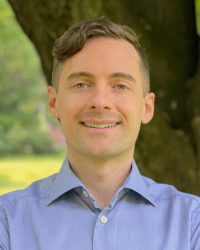
Ryan A. Flynn, M.D., Ph.D.
Boston Children's Hospital; Harvard University
Project Title: Functional Characterization of Cell Surface RNA Biology
Grant ID: R01-ES037423
Ryan Flynn was an undergraduate at MIT, where he worked in the lab of Phillip Sharp on small noncoding RNA biology. Subsequently he moved to Stanford where he completed his M.D. and Ph.D. with Howard Chang developing methods to study RNA-protein interactions. As a postdoctoral fellow, he trained with Carolyn Bertozzi at Stanford learning chemistry and glycobiology where he discovered cell surface glycosylated RNAs. The Flynn Lab is currently focused on advancing methods, mechanisms, and functions surrounding the glycoRNA molecule, which operates at the interface of RNA biology, glycobiology, and the cell surface in the context of human disease.
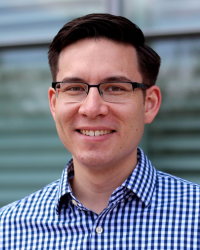
Alexander A. Green, Ph.D.
Boston University
Project Title: Programming Cellular Behavior by Mechanical Forces
Grant ID: R01-EB037112
MPIs: Julien Berro, Ph.D. and Xiaolei Su, Ph.D.
Dr. Green is an Associate Professor in the Biomedical Engineering Department at Boston University. He obtained his B.A.Sc. in Engineering Science from the University of Toronto, his Ph.D. in Materials Science and Engineering from Northwestern University, and pursued postdoctoral research at the Wyss Institute at Harvard. Dr. Green has conducted research in diverse areas ranging from synthetic biology to self-assembly to low-dimensional materials with applications in low-cost fieldable diagnostics, RNA-based therapies, and flexible electronics. He has received multiple awards in recognition of his research efforts, including an Alfred P. Sloan Research Fellowship in Computational & Evolutionary Molecular Biology, an NIH New Innovator Award, and a DARPA Young Faculty Award and Director’s Fellowship.
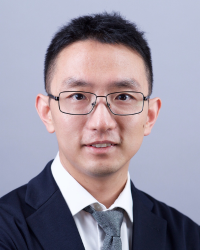
Chun-Jun (CJ) Guo, Ph.D.
Weill Cornell Medicine
Project Title: Activity Probes to Guide Precision Microbiome Therapy
Grant ID: R01-AT013241
MPIs: Randy Longman, M.D., Ph.D. and Aaron T. Wright, Ph.D.
Chun-Jun (CJ) Guo is an Assistant Professor in the Jill Roberts Institute for Research in Inflammatory Bowel Disease, Department of Medicine at Weill Cornell Medicine. He received his Ph.D. from the School of Pharmacy, the University of Southern California in 2015. As a postdoctoral fellow, he worked with Dr. Michael Fischbach at Stanford University where he studied small molecules produced by the human microbiota. Started in 2018, his lab at Weill Cornell Medicine aims to develop new tools to genetically manipulate the human microbiota and investigate the molecular mechanisms behind microbiome-host physiology interaction.
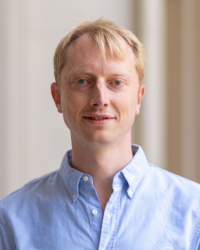
Anders Sejr Hansen, Ph.D.
Massachusetts Institute of Technology
Project Title: Resolving Transcription Factor Target Search Mechanisms
Grant ID: R01-CA300848
Anders Sejr Hansen is the Class of 1943 Associate Professor in the Department of Biological Engineering at MIT. He received his undergraduate degree in Chemistry from Oxford University, completed a PhD in Chemistry and Chemical Biology with Erin O’Shea at Harvard University, and carried out postdoctoral studies in biophysics and molecular biology with Robert Tjian and Xavier Darzacq at the University of California, Berkeley. At MIT, the Hansen lab develops new imaging, genomics, and computational methods towards understanding the relationship between the 3D organization of the genome and gene regulation.
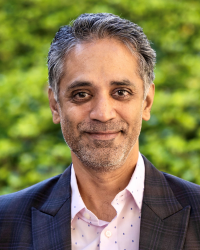
Sundeep Kalantry, Ph.D.
University of Michigan Medical School
Project Title: Evolution of Mammalian Sex Chromosome Dosage Compensation
Grant ID: R01-HD118514
Sundeep Kalantry is a Professor of Human Genetics at the University of Michigan Medical School. He received an AB in Biology, with a concentration in Biochemistry, from Cornell University and a PhD from Weill Cornell Graduate School of Medical Sciences, conducting his thesis work in developmental biology at the Sloan-Kettering Institute with Elizabeth Lacy. Dr. Kalantry then performed post-doctoral research in X chromosome inactivation at the University of North Carolina with Terry Magnuson. His research group at the University of Michigan investigates genetic and epigenetic mechanisms during embryonic development, with a focus on the evolutionary and mechanistic bases of dosage compensation. Dr. Kalantry’s work has received a number of awards, including the Julian R. Rachele Prize from Weill Cornell Medical College, NIH Pathway to Independence Award, and an NIH Director’s New Innovator Award.
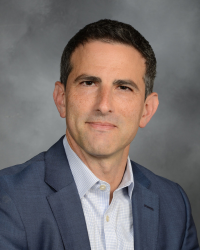
Randy Longman, M.D., Ph.D.
Weill Cornell Medicine
Project Title: Activity Probes to Guide Precision Microbiome Therapy
Grant ID: R01-AT013241
MPIs: Chun-Jun (CJ) Guo, Ph.D. and Aaron T. Wright, Ph.D.
Randy Longman is the Director of the Jill Roberts Center for Inflammatory Bowel Disease (IBD) and an Associate Professor of Medicine in the Jill Roberts Institute for Research in IBD at Weill Cornell Medicine. He received his B.S./M.S. from Yale University, M.D. from Weill Cornell Medical College, and Ph.D. in immunology from The Rockefeller University. He completed clinical training in Internal Medicine and Gastroenterology at Columbia University Medical Center and a post-doctoral research fellowship with Dr. Dan Littman at the NYU School of Medicine. His research focuses on defining the cellular and molecular mechanisms underlying host-microbiota interactions that drive the pathogenesis of mucosal and systemic inflammation in IBD. He is a member of the National Scientific Advisory Committee for the Crohn’s and Colitis Foundation, a recipient of the Irma T. Hirschl Career Scientist Award, and an elected member of the American Society for Clinical Investigation.
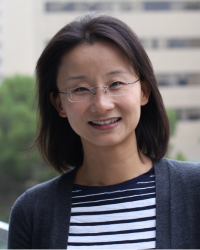
Rong Lu, Ph.D.
University of Southern California
Project Title: A Spatial View of Hematopoietic Regeneration Dynamics in the Bone Marrow
Grant ID: R01-DK143671
MPI: Michael Elowitz, Ph.D.
Rong Lu, Ph.D., is an Associate Professor in the Department of Stem Cell Biology and Regenerative Medicine at the Keck School of Medicine, University of Southern California, with additional affiliations in the Department of Medicine, the Department of Biomedical Engineering at the Viterbi School of Engineering, and the Leonard Davis School of Gerontology. Her research focuses on the regulation, coordination, and dysfunction of hematopoietic stem and progenitor cells using systems biology and single-cell approaches. She uses multidisciplinary methods to investigate the mechanisms that regulate stem cell networks during development, regeneration, aging, and disease. Dr. Lu received her Ph.D. in Molecular Biology under the mentorship of Dr. Ihor R. Lemischka at Princeton University and completed her postdoctoral training in Cell Biology with Dr. Irving L. Weissman at Stanford University. Her work has been recognized with numerous prestigious awards, including the NIH Pathway to Independence Award (K99/R00), the Leukemia & Lymphoma Society Scholar Award, and the NIH/NHLBI Emerging Investigator Award (R35).
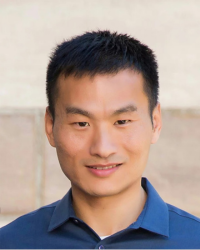
Xiaolei Su, Ph.D.
Yale School of Medicine
Project Title: Programming Cellular Behavior by Mechanical Forces
Grant ID: R01-EB037112
MPIs: Julien Berro, Ph.D. and Alexander A. Green, Ph.D.
Xiaolei Su is an Associate Professor of Cell Biology at Yale School of Medicine. His lab investigates transmembrane receptor signaling in immune response, with a focus on biomolecular condensation. The knowledge in basic cell biology is further leveraged to the design of novel chimeric antigen receptors (CARs) responding to both chemical and physical stimuli in the tumor microenvironment. The Su Lab integrates cross-scale approaches including biochemical reconstitution, high-resolution microscopy, cell engineering, and animal models to address fundamental questions in immune cell biology and to develop next-generation cell therapies for cancer.
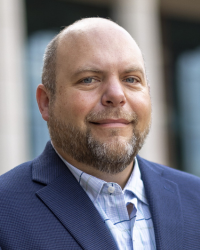
Aaron T. Wright, Ph.D.
Baylor University
Project Title: Activity Probes to Guide Precision Microbiome Therapy
Grant ID: R01-AT013241
MPIs: Chun-Jun (CJ) Guo, Ph.D. and Randy Longman, M.D., Ph.D.
Aaron Wright is the James R. Schofield Professor of Biomedical Sciences in the Department of Biology at Baylor University, with a secondary appointment in the Department of Chemistry & Biochemistry. His chemical biology research focuses on providing mechanistic understanding of host-microbiome-environment interactions with high resolution at the level of protein structure and activity. His group works at the interface of chemistry, microbiology, and multi-omics to develop and apply new function-driven capabilities to enable discoveries in complex microbial systems. Prior to joining Baylor University, he was the group leader for Chemical Biology and Biological Systems Sciences at Pacific Northwest National Laboratory and held a joint faculty position at Washington State University. He received his B.S. in Chemistry from George Fox University, his Ph.D. in Organic Chemistry from the University of Texas at Austin and was a postdoctoral fellow in Chemical Biology at The Scripps Research Institute.


